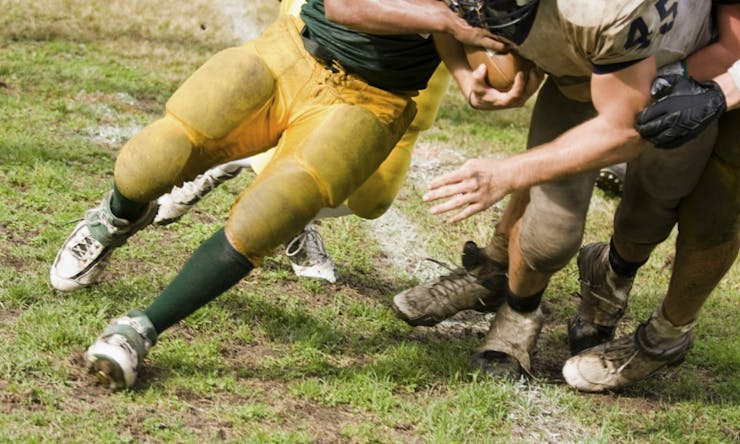You’ve heard that football players are pumped full of painkillers. Ever wonder what that looks like? Baltimore Ravens tackle Eugene Monroe wants to show you.
In a piece yesterday for The Players’ Tribune, Monroe demystifies what players call the T Train—“nothing more than a bunch of really large guys waiting to pull their pants down to get shot in the butt with Toradol, a powerful painkiller that will help them make it through the game and its aftermath.”
That’s just the beginning. After a concussion suffered during a game in Denver, Monroe was dosed with Tylenol, Ambien, and Topiramine to ease his headache and help him sleep. “They didn’t seem to do much,” he writes, and “their list of side effects seemed endless.”
“There has to be a better way,” he concludes. “There is a better way.”
In March, Monroe became the first active NFL player to openly advocate for the use of medical cannabis to treat chronic pain and head injuries. As he explains in the Players’ Tribune:
“The NFL relies heavily on opioids to get players back on the field as soon as possible, but studies have shown medical marijuana to be a much better solution; it is safer, less addictive and can even reduce opioid dependence. Some studies have also shown that cannabidiol (CBD) — one of the more than 100 cannabinoids found in marijuana — may function as a neuroprotectant, which means it can shield the cells in the brain from injury or degeneration. We need to learn more about this.”
A growing number of athletes have started pushing back against the league’s official restrictions on cannabis. But while other NFL players have held off until retirement to take up the cause, Monroe isn’t waiting. He wants the league to remove cannabis from its list of banned substances, fund research into cannabinoids and brain injuries, and curb the prescription of opioid painkillers.
“How can a league so casual about the use of addictive opioids take such a hard line on a drug that might provide a safer alternative?” Monroe writes.
The NFL, for its part, is borrowing a play from the federal government: stall, stall, stall.
"We believe it's the correct policy, for now, in the best interest of our players and the long-term health of our players," NFL Commissioner Roger Goodell said at a news conference in February. "I don't foresee a change in that clearly in the short term, but we'll continue to be in touch with our medical personnel. If that changes, we'll discuss it."
The league told ESPN that the policy on medical cannabis is guided by medical advisers who have not indicated a need to change it.








